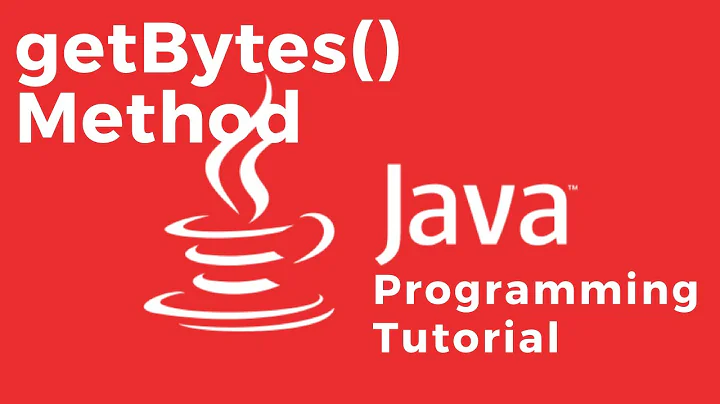UTF-8 byte[] to String
Solution 1
Look at the constructor for String
String str = new String(bytes, StandardCharsets.UTF_8);
And if you're feeling lazy, you can use the Apache Commons IO library to convert the InputStream to a String directly:
String str = IOUtils.toString(inputStream, StandardCharsets.UTF_8);
Solution 2
Java String class has a built-in-constructor for converting byte array to string.
byte[] byteArray = new byte[] {87, 79, 87, 46, 46, 46};
String value = new String(byteArray, "UTF-8");
Solution 3
To convert utf-8 data, you can't assume a 1-1 correspondence between bytes and characters. Try this:
String file_string = new String(bytes, "UTF-8");
(Bah. I see I'm way to slow in hitting the Post Your Answer button.)
To read an entire file as a String, do something like this:
public String openFileToString(String fileName) throws IOException
{
InputStream is = new BufferedInputStream(new FileInputStream(fileName));
try {
InputStreamReader rdr = new InputStreamReader(is, "UTF-8");
StringBuilder contents = new StringBuilder();
char[] buff = new char[4096];
int len = rdr.read(buff);
while (len >= 0) {
contents.append(buff, 0, len);
}
return buff.toString();
} finally {
try {
is.close();
} catch (Exception e) {
// log error in closing the file
}
}
}
Solution 4
You can use the String(byte[] bytes) constructor for that. See this link for details.
EDIT You also have to consider your plateform's default charset as per the java doc:
Constructs a new String by decoding the specified array of bytes using the platform's default charset. The length of the new String is a function of the charset, and hence may not be equal to the length of the byte array. The behavior of this constructor when the given bytes are not valid in the default charset is unspecified. The CharsetDecoder class should be used when more control over the decoding process is required.
Solution 5
Knowing that you are dealing with a UTF-8 byte array, you'll definitely want to use the String constructor that accepts a charset name. Otherwise you may leave yourself open to some charset encoding based security vulnerabilities. Note that it throws UnsupportedEncodingException which you'll have to handle. Something like this:
public String openFileToString(String fileName) {
String file_string;
try {
file_string = new String(_bytes, "UTF-8");
} catch (UnsupportedEncodingException e) {
// this should never happen because "UTF-8" is hard-coded.
throw new IllegalStateException(e);
}
return file_string;
}
Related videos on Youtube
Comments
-
skeryl about 4 years
Let's suppose I have just used a
BufferedInputStreamto read the bytes of a UTF-8 encoded text file into a byte array. I know that I can use the following routine to convert the bytes to a string, but is there a more efficient/smarter way of doing this than just iterating through the bytes and converting each one?public String openFileToString(byte[] _bytes) { String file_string = ""; for(int i = 0; i < _bytes.length; i++) { file_string += (char)_bytes[i]; } return file_string; }-
CoolBeans over 12 yearsWhy can't you just do this
String fileString = new String(_bytes,"UTF-8");? -
Andy Thomas over 12 yearsAlternatively, you could use BufferedReader to read into a char array.
-
Bruno over 12 yearspossible duplicate of In Java, how do I read/convert an InputStream to a String?
-
skeryl over 12 years@CoolBeans I could if I had known to do that ;) Thank you.
-
Bruno over 12 yearsDepending on the file size, I'm not sure loading the whole
byte[]in memory and converting it vianew String(_bytes,"UTF-8")(or even by chunks with+=on the string) is the most efficient. Chaining InputStreams and Readers might work better, especially on large files. -
CoolBeans over 12 years@Bruno - That's a valid observation. I guess he will find out if he starts getting out of memory exceptions :)
-
 Raedwald about 9 yearsYour provided cide does not decode UTF-8. It does not handle any of the code points that require multiple bytes.
Raedwald about 9 yearsYour provided cide does not decode UTF-8. It does not handle any of the code points that require multiple bytes.
-
-
Mike Daniels over 12 yearsAnd if your bytes are not in the platform's default charset, you can use the version that has the second
Charsetargument to make sure the conversion is correct. -
 zengr over 12 yearsmy dear lord.
zengr over 12 yearsmy dear lord.String str = new String(byte[])will do just fine. -
 Ted Hopp over 12 yearsThis improves the efficiency, but it doesn't decode utf8 data properly.
Ted Hopp over 12 yearsThis improves the efficiency, but it doesn't decode utf8 data properly. -
GETah over 12 years@MikeDaniels Indeed, I did not want to include all the details. Just edited my answer
-
Bruno over 12 yearsSometimes, it's useful to keep the original line delimiters. The OP might want that.
-
siledh over 10 yearsOr Guava's Charsets.UTF_8 if you are on JDK older than 1.7
-
 scottt over 10 yearsCode edited to make the default be utf-8 to match the OP's question.
scottt over 10 yearsCode edited to make the default be utf-8 to match the OP's question. -
Ben Clayton over 9 yearsUse Guava's Charsets.UTF_8 if you are on Android API below 19 too
-
Attila Neparáczki over 9 yearsAnd if checkstyle says: "Illegal Instantiation: Instantiation of java.lang.String should be avoided.", then what?
-
 nyxz about 9 yearsYou can see in here the
nyxz about 9 yearsYou can see in here thejava.nio.charset.Charset.availableCharsets()map all the charsets not just the charsets in theStandardCharsets. And if you want to use some other charset and still want to prevent the String constructor from throwingUnsupportedEncodingExceptionyou may usejava.nio.charset.Charset.forName() -
Aung Myat Hein almost 8 yearsIOUtils.toString(inputStream, StandardCharsets.UTF_8) is deprecated now.
-
 greg-449 about 7 yearsThis doesn't specify a character set so you get the platform default character set which may well not be UTF-8.
greg-449 about 7 yearsThis doesn't specify a character set so you get the platform default character set which may well not be UTF-8. -
 Dayan almost 6 yearsThis will crash on large data with out-of-memory on a TC75 Zebra device.
Dayan almost 6 yearsThis will crash on large data with out-of-memory on a TC75 Zebra device. -
 Admin almost 6 yearsIsn't using the String constructor discouraged as it may result in having two different string objects containing the same character data?
Admin almost 6 yearsIsn't using the String constructor discouraged as it may result in having two different string objects containing the same character data? -
 programmerRaj over 2 yearsIt worked for me without specifying
programmerRaj over 2 yearsIt worked for me without specifyingStandardCharsets.UTF_8. I just didnew String(bytes) -
http8086 about 2 years
Constructs a new {@code String} by decoding the specified array ofsays in java source doc, wondering, if there are bytes can not be decoded in specified Charset, lets say UTF-8, then what will happen.




![Convert C# Byte Array To String - byte[] GetBytes GetString BitConverter Encoding UTF8 ASCII Char](https://i.ytimg.com/vi/L9Qe8eUxWj4/hq720.jpg?sqp=-oaymwEcCNAFEJQDSFXyq4qpAw4IARUAAIhCGAFwAcABBg==&rs=AOn4CLDgTZYq9HPQGCY42X7h7myLVeHo7Q)

![How to convert UTF-8 byte[] to string - C#](https://i.ytimg.com/vi/W_OKi9jusIU/hq720.jpg?sqp=-oaymwEcCNAFEJQDSFXyq4qpAw4IARUAAIhCGAFwAcABBg==&rs=AOn4CLCY3PKNdFPEc9aFoevYfEYKZNjU4A)

![How to convert UTF-8 byte[] to string - Array](https://i.ytimg.com/vi/m7YSjD7R3eU/hq720.jpg?sqp=-oaymwEcCNAFEJQDSFXyq4qpAw4IARUAAIhCGAFwAcABBg==&rs=AOn4CLCw-0EXaHO9YZ3_aIqxl0OnMlXokA)